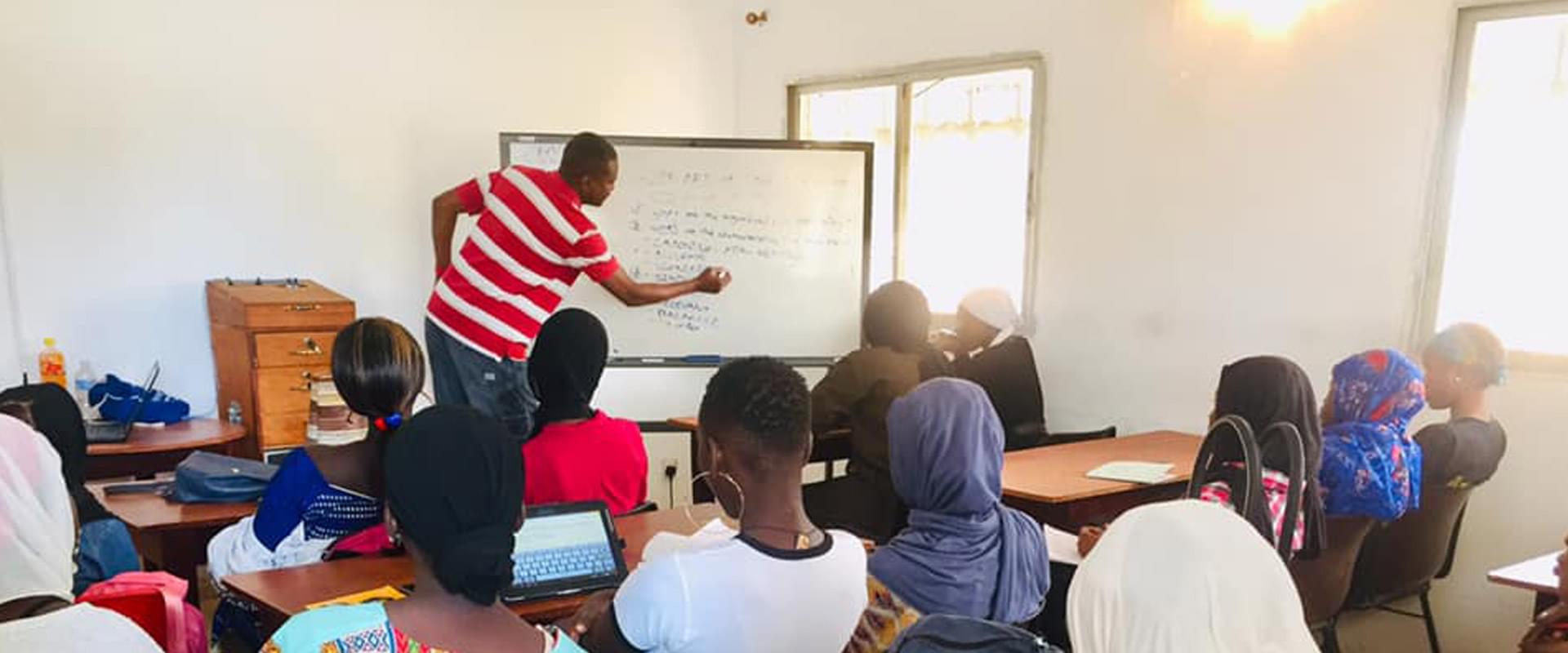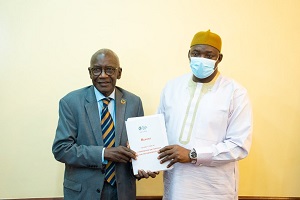
Mar 4, 2022 8:51 AM | Article By: Fatou Dahaba

Charman, Dr. Lamin J. Sise handed over the TRRC final report to President Adama Barrow on 25th November 2021 at State House in Banjul (Photo: TRRC)
The Truth, Reconciliation and Reparations Commission (TRRC) has released its final reports following more than two years of investigations into the alleged human rights abuses perpetrated under the 22-year-old regime of Yahya Jammeh.
However, fear and disappointments had engulfed the victims when President Adama Barrow formed an alliance with the Alliance for Patriotic, Re-Orientation and Construction (APRC) to support his re-election bid in the December 4th presidential election.
To victims, this was a clear indication that Barrow’s government will not fully implement the TRRC’s recommendations for political interest because he would avoid angering Jammeh’s influential people, some of whom are in fact, indicted by the Commission’s findings. However, victims and activists found solace recently when the president had vowed to implement the report’s recommendations.
Call and hope for justice
Awa Njie, the widow of Abdoulie ‘Dot’ Faal, the slain military officer, would want to see the implementation of the TRRC recommendations on top of the government’s agenda.
Dot Faal with several soldiers, was murdered extra-judicially on Jammeh’s order, following their implication in the alleged November 11 military foiled coup in 1994.
For Awa, justice is all she needs after the mysterious killing of her husband in cold blood. “It is very difficult to look at the person who killed your husband, walking freely and you cannot do anything about it. If justice is not served, victims can take the law into their own hands.”
“Even, if I’m going to vote it would be a person who would look at the victims and push the government to implement the TRRC report and make sure perpetrators are brought to book.”
Among the human rights abuses caused by Yahya Jammeh’s government, religious freedom was at the centre of the right violations. Members of the ‘Ndigal’, a religious sect with origin in Kermonthali, in the Central River Region were evicted and forced to flee to Senegal because of their religious views.
Talking to this medium, Yunusa Ceesay, a Ndingal member says there’s high hope on the government to implement the recommendations.
“I have no reason to be pessimistic. I will however be extremely disappointed, if the government were to take any other action different from doing justice to the work of the Commission. Jammeh and his enablers must be held responsible for their crimes, and justice must prevail.”
Like other victims, Yunusa Ceesay assured to vote for a person who would put national interest first and advise the government to implement the TRRC recommendations.
“Whosoever is going to stand firm and defend that I would definitely vote for that person. My expectation from the next parliamentarians is the elected candidate to make sure that whatever is put on the table is properly looked into and aligned with the interest of the State instead of party or individual.”
Sheriff Kijera, Chairperson of the Gambia Centre for Human Rights Violations, otherwise called Victims’ Centre, describes the alliance between Barrow and the APRC as unfortunate and a betrayal of trust. “The alliance is a slap on the face of victims of Jammeh.”
On the contrary, he lauds the government’s initiative in establishing the TRRC which has unraveled the gross human rights violations that occurred during former president Jammeh 22 year’s reign; adding that, the Barrow’s government is the architect of the entire transitional justice process and therefore shouldn’t be anything to undermine the commission`s work.
“Let’s give them the benefit of the doubt that they will implement the recommendations of the Commission. I’m confident that the Barrow administration will do justice and fully implement the recommendation.”
Kijera and the Victims’ Centre are not relenting on their efforts to engage the government constructively by advocacy and bilateral means to ensure that the government is committed to implementing the TRRC recommendations.
Stakeholder perspective
The Chairman of the National Human Rights Commission (NHRC), Emmanuel Joof calls for efforts to make Gambians know about crimes committed during the 22 years rule of former president Yahya Jammeh.
“There must be a sustained effort to make sure that Gambians from all walks of life know exactly what happened in the atrocities committed by the APRC government during the 22 years rule of Jammeh. The TRRC report will therefore be translated into all the major local languages and the information disseminated through the radio (including community radios, TV, and schools etc.”
He expresses his institution’s commitment to engaging the government to take seriously the recommendations of the TRRC, and incorporate them in the anticipated White Paper which is due in May 2022; adding that NHRC, as a human rights protection mechanism, would be monitoring and investigating all future human rights abuses in the country.
“NHRC will continue to engage the government and the National Assembly on reforming laws so that they are aligned with human rights principles and laws, especially international and regional treaties and conventions that the Gambia has ratified.”
A human rights activist, Madi Jobarteh suggests the prosecution of perpetrators of the various human rights violations as recommended by the Commission.
“…if we fail to address injustices and violations, the tendency for victims to take the law into their own hands is high, while the perpetrators will be empowered on the cause of human rights abuses without accountability.
“When that happens then impunity prevails in the society, which means eventually it is a matter of survival of the fittest and a culture of violations becomes the order. Hence, the need to deliver justice is indispensable and urgent.”
Assurance of justice
Meanwhile, in his attempt to dissuade tension of anxiety among victims, President Barrow, during his first press conference following his re-election in December says that the TRRC is an important project in his government and would be part of his legacy.
“I want to assure that there will be justice, reconciliation and reparations, it will all happen. We would follow the due process and take the right direction in which a decision would be taken.”
The truth commission was established on the mantra ‘Never Again’ as it aspires to put an end to human rights violations in the country, following what some describe as ‘a bloody and traumatic 22 years tyranny’ by Jammeh. The Commission has submitted its report to President Barrow on 25th November 2021 and the Government is expected to issue a white paper on the document in May 2022.
Comments (0)
10 Likes
Leave your thought here
Your email address will not be published. Required fields are marked *